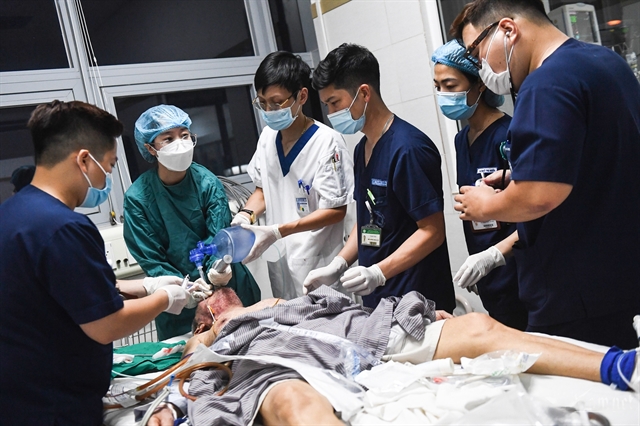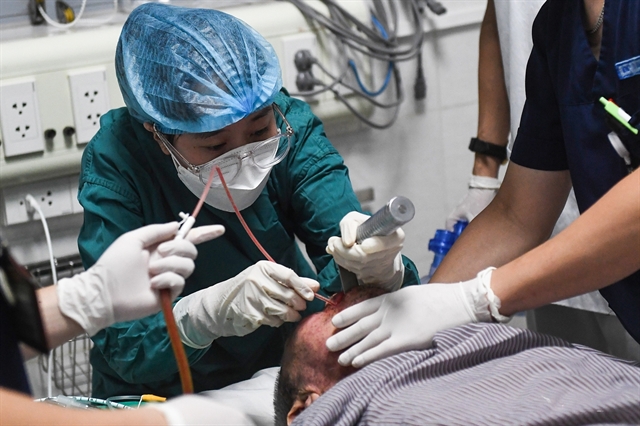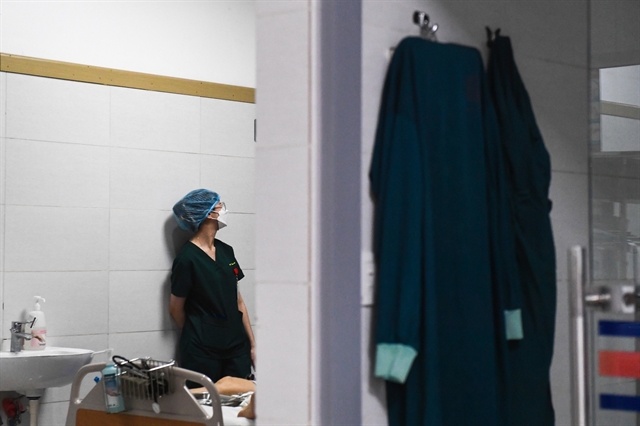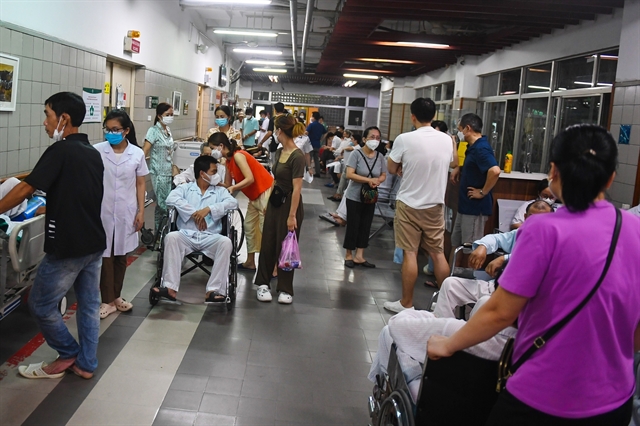 Society
Society

At 5.30 pm, a team of 30 medical professionals including specialists, resident doctors, and nurses begin their night shift. Bạch Mai Hospital has around 150 emergency beds, with 73 of them located in the Intensive Care Unit, always occupied by patients. Most of the patients are transferred here from other departments or lower-level hospitals in critical or life-threatening conditions. That's why the Intensive Care Unit at Bạch Mai Hospital is likened to the "last fortress," or the "final line of defense."

|
| Phan Kim Lê has been working as a resident doctor since 2021. Photo vietnamnet.vn |
For resident doctor Phan Kim Lê, 28, day and night just blend into one.
She performed a procedure for a new patient admitted at in Bạch Mai Hospital's Intensive Care Unit in Hà Nội when the clock struck 3am.
Bạch Mai Hospital has around 150 emergency beds, with 73 of them located in the Intensive Care Unit, and always occupied by patients. Most are transferred here from other departments or lower-level hospitals in critical or life-threatening conditions. That's why the Intensive Care Unit at Bạch Mai Hospital is likened to the "last fortress," or the "final line of defence."
At 5.30pm, Lê, among a team of 30 medical professionals including specialists, resident doctors, and nurses, begin their night shift.
On average, each patient requires 50-70 tasks per day. This is a completely isolated area, so family members can not enter to provide care. From eating, changing clothes, personal hygiene, to X-rays, surgeries, and medication administration — when in critical condition, patients are immobile, entirely dependent on the nursing and medical staff. Communication with the patients is severely limited due to unconsciousness or weakened health. If they are able to interact, some may be delirious and not lucid. The doctors and nurses must pay close attention to meet the patients' needs, online newspaper Vietnamnet reported.
The job consumes lots of time. By 9pm, some doctors haven't even had dinner. Outside the MRI room, family members and patients are queuing, waiting anxiously.
A nurse flipped through the newly received medical records and quickly informed Doctor Lê about the patient's deteriorating condition.
After completing medical training at Hanoi Medical University, Lê passed the residency selection exam. Since 2021, she has been working dedicatedly as a resident doctor at the Intensive Care Unit of Bạch Mai Hospital in Hà Nội.

|
| Lê performs a procedure on a patient. Photo vietnamnet.vn |
"Nam, please help me," Lê called out, poking her head out of the room. Several nurses left their unfinished tasks and rushed in but they couldn't restrain him as the elderly man continued to struggle and was uncooperative.
"It's even difficult to draw blood like this. Xuân, prepare a sedative for me. Đức, prepare the paperwork for the patient's family to sign. First, I'll suction out the phlegm. There are signs of bleeding, so I'll perform a tracheal intubation procedure afterward." Taking charge of the case, Lê became the attending physician directly responsible for treating this patient. She quickly delegated tasks to her colleagues for support, while preparing the necessary equipment. The entire team was busy at until 2.30am.
After completing the initial tasks for the newly admitted patient, Kim Lê sat back at her desk. She suddenly remembered that she had forgot to call her parents tonight. Born in Nghe An, she moved to Hanoi for education, far away from home like many of her peers. When she was still a student, she would always call her parents every evening, and she would travel back to her hometown by train or bus on weekends. However, this habit gradually changed after she became a resident doctor.
"Coming and going at odd hours, there's no fixed schedule that matches my parents' activities, so the phone calls became less frequent," Kim Lê said.
Most of her time during the day is for the patients. Lê takes a minimum of two night shifts per week, along with day shifts, and occasionally additional night shifts. A night shift lasts from 5.30pm to 7am the next morning, followed by a meeting and continued work until the afternoon. Then she gets some rest and starts the cycle again. Being at the hospital frequently means having less time for other relationships.

|
| deciding to pursue a career as a resident doctor, Lê has temporarily set aside her personal life. Photo vietnamnet.vn |
"We joke that we visit our rented rooms to see our homes. As for our parents' homes in the countryside, it takes several months to visit family. It's no wonder that being single matches our real capabilities. When we are free, we prefer sleeping over having a date," she joked.
In reality, most of her peers have already married and have children at her age. However, her parents never pressure her because they know their daughter is too busy.
"I knew being a resident doctor would be tough, and everyone who has gone through it says the same. But it's only when you step into it that you truly understand what 'tough' means. Initially, everyone struggles with the intensity of this work, then, we adapt and it becomes a routine."
After deciding to pursue a career as a resident doctor, Lê has temporarily set aside her personal life. She accepted that her parents have to take care of her tuition fees, and she relies on a meager subsidy for her living expenses. She shares that her main concerns are rent and food, but even the food expenses are minimal since she eats at the hospital. She doesn’t spend any money on clothes, shoes, or cosmetics because "I'm in the hospital all day and don't need them."
"Next year, the tuition fees will increase, over forty million Vietnamese dong for a year. I only worry about how hard it is for my parents… I can adapt to new challenges anyway." Lê said hesitatingly. For her, being a resident doctor is the shortest path to improve her skills, and she's willing to sacrifice three years. She just feels a pang of guilt about not being able to repay her parents.
After 3am, the female resident doctor finally slumps onto her desk to rest her eyes after 11 hours of work. It was not even 15 minutes until she was awakened by an unexpected situation. Admitted to the department in critical condition, the treatment process faced many difficulties due to the patient's paralysed legs and a body weight of 100kg. During the night, the patient's heart rate dropped significantly, indicating a deteriorating condition and challenging progress. The continuous renal replacement therapy machine beside the bed operated non-stop. Meanwhile, the nurses continuously administered medication to stabilise the vital signs.
The family members outside had been informed about the high risk of death. After 30 minutes, the situation continued to worsen. Lê and Doctor Kiên were sent out to meet the family and report on the condition again, seeking their opinion. Holding the folded medical records, she took a deep breath and regained a calm demeanor before pushing the door to step out. Lê articulated the current condition of the patient to the family so that they could understand clearly. "We deeply regret the worsening condition of your loved one," she said.
At this point, the family chose to sign the document to allow the patient to pass away peacefully without emergency measures.
Around 4am, the heart rate reached zero, the doctors removed the breathing tube, and they helped the family complete the procedures and call for a vehicle to transport the patient's body to the funeral home. An hour later, the vehicle arrived and they helped each other to carry the body down to the ground floor.
In reality, "the last line of defense" means every second and minute is a battle for life.

|
| The Intensive Care Unit at Bạch Mai Hospital is likened to the "last fortress," or the "final line of defence." Photo vietnamnet.vn |
At 7am, a new working day continues with a tremendous workload. It's slightly easier compared to the night shift due to the addition of a team of high-quality medical interns. Each internship period, the department receives hundreds of students because training at the Intensive Care Center of Bạch Mai Hospital is always the top choice for many young people.
Phạm Thế Thạch, Deputy Director of the Intensive Care Center, has been dedicated to his profession for 17 years. He wonders if it is due to the challenging difficulties that many students come to study, but they seem to disappear after graduation.
Thạch doesn't deny the hardships that a doctor has to face. However, for him, every profession in society has its own difficulties so it is difficult to compare experiences.
"For me, the harder it gets, the more relentless efforts it brings forth. Progress can only be achieved through continuous exertion. If one is content with comfort and ease, then there's no need to strive for anything," he said. VNS




